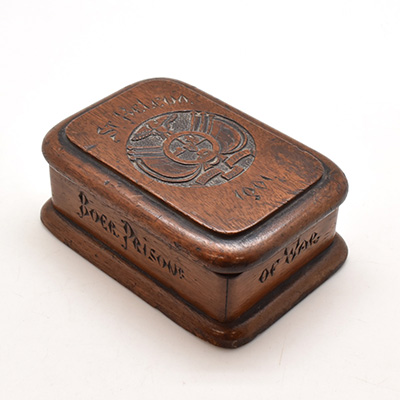BOER (bow-uh), AFRICA
Who were/are the Boer?
Language - Afrikaans
Religion - Protestant Christianity
Descendants of the Dutch-speaking Free Burghers of the eastern Cape frontier
Ethnicity - White South African or Afrikaner
A prisoner's box
This object was made by a prisoner of the Second Boer War or Anglo-Boer war (1899- 1902). This object from the old prison Deadwood Camp on the island of St Helena in the South Atlantic. Deadwood Camp was the first overseas British camp and prison for Boer prisoners of war. From the years 1900 to 1902, it is estimated that around 9,000 prisoners of war were imprisoned there. These prisoners were Boer men of working age.
The prison on St. Helena was unique as during the Boer war it allowed freedom and innovation. Other prisons and camps for Boer women and children, and Black African people – men, women, and children, were sent to racially segregated concentration camps with poor conditions and shocking treatments in South Africa.
As of today, nothing remains from the prison/ camps on St Helena Island, and it is a place for botanists and various biologists to study.
This object can tell us stories of the complexities and atrocities of The British Empire.
Wooden box with hinged lid - 2019.49
The finely crafted wooden box has an inscription on the top that reads “St. Helena 1901”. The text around the sides reads: “Made by Boer prisoner of war”. The box opens from the left-hand side and inside is an empty wooden space. We currently do not know what this specific box was used for, but we believe that it was likely used as storage. To occupy the prisoners’ time in St Helena, they were encouraged to do extra-curricular activities and enhance their skills. Many prisoners were highly skilled craftsman and created boxes such as this one, showing a lot of creativity, and resourcefulness. They made things like tools and boxes, made of wood or bone.
Some of the objects had pop up animals in them once they were opened.
Boxes like this one were sold for a profit and those prisoners with entrepreneurial skills were allowed to start businesses. Today, objects like these are rare and highly collectable. We don’t know how or if the prisoners made a profit from their creations whilst in prison.
How did the Boer war affect The British Empire? What impact does understanding more about the Boer war have on your idea of postcolonialism? What would be the impacts of the British on descendants of those imprisoned?




